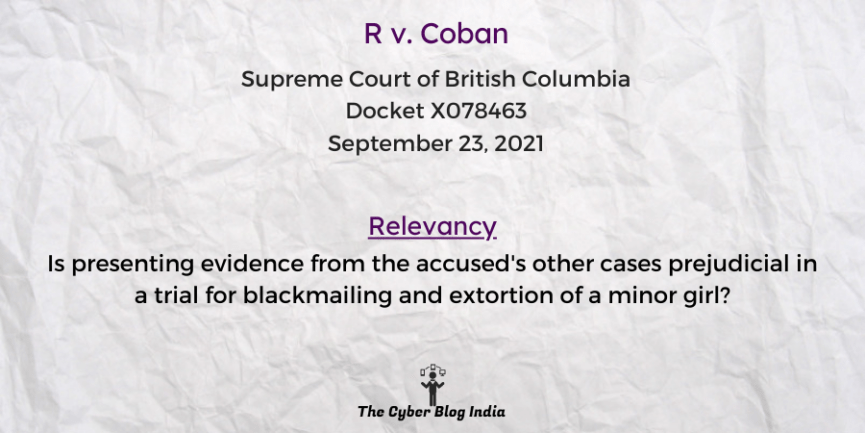R. v. Coban

R. v. Coban
2021 BCSC 1855
In the Supreme Court of British Columbia
Docket X078463
Before Justice Devlin
Decided on September 23, 2021
Relevancy of the Case: Is presenting evidence from the accused’s other cases prejudicial in a trial for blackmailing and extortion of a minor girl?
Relevant Facts of the Case
- Coban, the accused, extorted an underage girl over the Internet from January 2009 to October 2012.
- He used multiple aliases over different platforms such as Skype, Facebook, YouTube, and email to communicate with the underage girl and then with her family, friends, and teachers.
- In 2014, the police seized 12 devices from his residence. The court scheduled a jury trial in January 2022. The Crown has filed the present application for the admissibility of evidence related to the accused.
Prominent Arguments by the Counsels
- The Crown’s counsel seeks to present 10 bodies of evidence, most prominently evidence of extortion of other persons, to identify the accused in those schemes.
- The accused’s counsel opposed the following pieces of evidence:
- The video stills showing unsavoury .txt files
- The deleted messages
- The fraudulent possession of financial instruments and IT documents
- Messages in other sextortion cases
- The accused’s counsel argued that all these pieces of evidence are prejudicial to the jury, and their probative value was much lower than their prejudicial effect.
Opinion of the Bench
- Much of the evidence related to the extortion of other persons was highly prejudicial. This would affect the jury trial, but much of that evidence could also be used to identify and connect the accused to the particular case.
- The aliases present in those other sextortion cases had also messaged or emailed the victim in the present case.
- Hence, the Crown can present the evidence in a limited capacity while instructing the jury.
Final Decision
- The Court permitted the Crown to present evidence in a limited capacity.
Arnav Kaman, an undergraduate student at Rajiv Gandhi National University of Law, Punjab, and Ritesh Karale, an undergraduate student at Maharashtra National Law University, Mumbai, prepared this case summary during their internship with The Cyber Blog India in January/February 2024.
